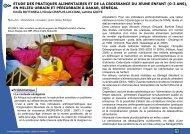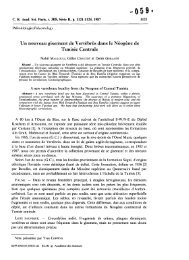L'anthropologie du vivant : objets et méthodes - CNRS - Dynamique ...
L'anthropologie du vivant : objets et méthodes - CNRS - Dynamique ...
L'anthropologie du vivant : objets et méthodes - CNRS - Dynamique ...
- No tags were found...
You also want an ePaper? Increase the reach of your titles
YUMPU automatically turns print PDFs into web optimized ePapers that Google loves.
Eléments d’épidémiologie bioanthropologiqueles conséquences sanitaires des changements récents dans les rapportsHomme-milieu, sous l’influence de ce que l’on appelle globalement la«modernisation», c’est-à-dire les transitions que vivent la plupart dessociétés rurales (Wirsing, 1985 ; Swedlund, Armelagos 1990).Au total, l’évolution des systèmes de pro<strong>du</strong>ction, la transformation despaysages, <strong>et</strong> leurs conséquences sanitaires seront traitées dans laperspective de l’écologie humaine, c’est-à-dire de l’analyse des processusbio-culturels de la relation homme-milieu (Hens <strong>et</strong> al. 1998). C’estla double notion de plasticité <strong>et</strong> d’adaptitude (aptitude à l’adaptation),par rapport à l’environnement, <strong>et</strong> de variabilité (dans le temps <strong>et</strong> dansl’espace, intra <strong>et</strong> inter-populationnelle), qui trace le cadre de la diversitéhumaine, laquelle servira de base à une analyse comparative.Références bibliographiquesBENOIST (J.) 1968. Esquisse d’une biologie de l’homme social.Montréal, Presses de l’Université de Montréal, 59 p.DAMON (A.) (ed.) 1975, Physiological Anthropology. Oxford UniversityPress, Oxford.EWALD (P. W.) 1996, Evolution of Infectious Disease. OxfordUniversity Press, Oxford.FAINZANG (S.) 2001, L’anthropologie médicale dans les sociétésoccidentales. Récents développements <strong>et</strong> nouvelles problématiques.Sciences Sociales <strong>et</strong> Santé, 19 : 5-28.FROMENT (A.), BLEY (D.), ENEL (C.) 2007, Anthropologieépidémiologique: la dimension médicale de l’écologie humaine. In:Guihard-Costa A.M., Bo<strong>et</strong>sch G., Froment A., Guerci A. & Robert-Lamblin J. (éds), L’anthropobiologie des populations <strong>vivant</strong>es,état des lieux. Editions <strong>CNRS</strong>, Paris, p. 69-82.GARINE (I. De) 1990, Adaptation biologique <strong>et</strong> bien-être psychoculturel.Bull. Mém. Soc. Anthrop. Paris, ns, 2: 151-173.GILLETT (J.D.) 1985, The behaviour of Homo sapiens, theforgotten factor in the transmission of tropical disease. Trans.Roy. Soc. Trop. Med. Hyg., 79: 12-20.GRENFELL (B.), HARWOOD (J.) 1997, (M<strong>et</strong>a)populationdynamics of infectious disease. Trend in Ecol. and Evol., 12:395-399.L’anthropologie <strong>du</strong> <strong>vivant</strong> : <strong>obj<strong>et</strong>s</strong> <strong>et</strong> méthodes - 2010GRMEK M. (1983) Les maladies à l’aube de la civilisation occidentale.Payot, Paris.GUERCI (A.), CONSIGLIERE (S.) 2003, Anthropologie médicale, In:Ch. Susanne, B. Chiarelli & E. Rebato (directeurs), Sur les Traces dela Biologie Humaine. Les Fondements de l’Anthropologie Biologique.De Boeck, Bruxelles, p. 625-630.HENS (L.), BORDEN (R.J.), SUZUKI (S.), CARAVELLO (G.) 1998,Research in Human Ecology : an interdisciplinary overview. VUBUniversity Press, Bruxelles.McELROY (A.), TOWNSEND (P.K.) 1985, Medical Anthropology inEcological Perspective. Westview Press, Boulder.McKENNA (J.J.), TREVATHAN (W.), SMITH (E. O.) 2008, Evolutionarymedicine and health: new perspectives. Oxford University Press,Oxford.NICOLLE (Ch.) 1932, Destin des maladies Infectieuses. Paris, Assoc.des Anciens Elèves de l’Institut Pasteur, réed. 1993.O’HIGGINS (P.), ELTON (S.) 2008, Medicine and Evolution: CurrentApplications, Future Prospects. Soci<strong>et</strong>y for the Study of HumanBiology Symposium Series, CRC, Boca Raton.STEARNS (S.C.), KOELLA (J.K.) 2008, Evolution in health anddisease. Oxford University Press, Oxford.SWEDLUND (A.C.), ARMELAGOS G.J. (éds) (1990) Disease inPopulations in Transition. Anthropological and EpidemiologicalPerspectives. New York, Bergin & Garvey.WILLIAMS (G.), NESSE (R. M.) 1996, Why we g<strong>et</strong> sick: the newscience of Darwinian medicine. Vintage Books, New York.WIRSING (R.) 1985, The health of traditional soci<strong>et</strong>ies and the effectsof acculturation. Current Anthropology 26: 303-322.L’auteurAlain FROMENTDirecteur de recherche à l’IRD- UMR 208 «patrimoines locaux (Paris, France)IRD <strong>et</strong> MNHNcourriel : froment@mnhn.fr31











